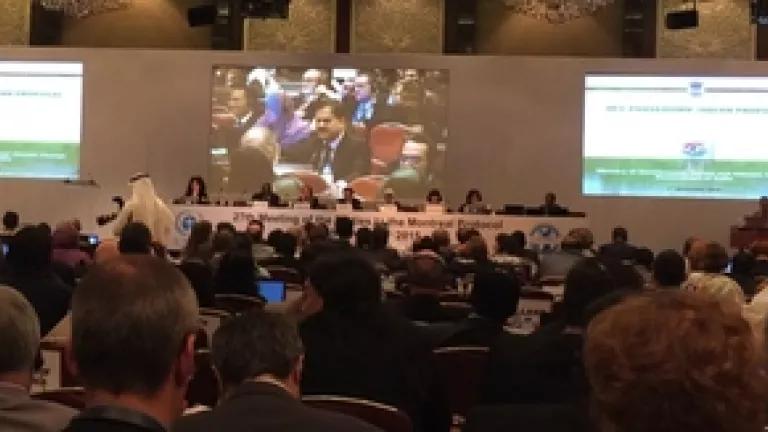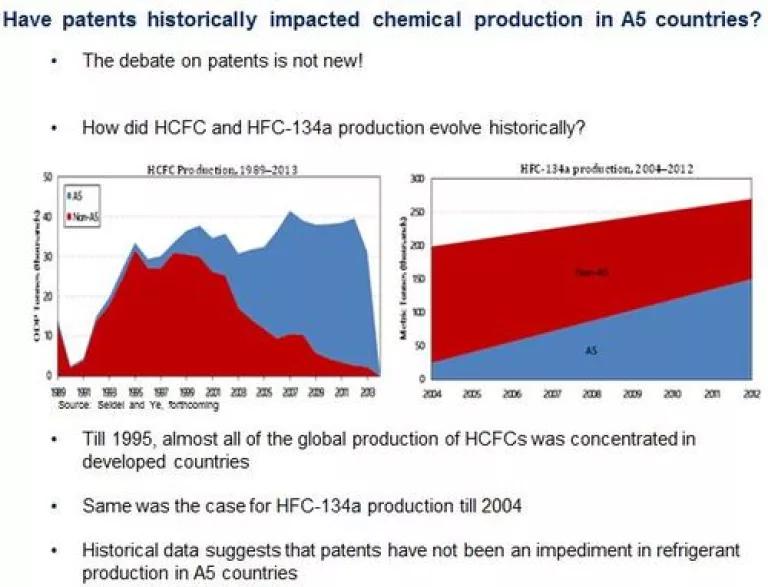Getting Closer to Phasing Down Hydrofluorocarbons Under the Montreal Protocol: Early Updates from Dubai

Guest blog by Nehmat Kaur and Bhaskar Deol
Climate change is a "top threat" to India's economy, according to key Modi government officials. India and countries around the world have an immediate opportunity to take action to reduce the climate change threat at the Montreal Protocol meetings in Dubai by agreeing to an amendment to phase down hydrofluorocarbons (HFCs). In keeping with the momentum, the meetings began with a positive start on Sunday with the parties formally establishing a "contact group" to discuss managing HFCs. An amendment reached in Dubai would also send a strong signal ahead of the Paris climate talks that international leaders can come together to protect the planet and mitigate global warming.
With the formation of the contact group, countries can now find common ground on practical solutions to challenges that India and other developing countries have identified. The main challenges are: developing a phase-down schedule consistent with the timing of the availability of alternatives, assuring the adequacy of finance and access to technology, as well as, patent licensing and intellectual property issues. The discussions are in the context of the four amendment proposals that have already been presented, including the proposal by India.
India presents its proposed amendment to Montreal Protocol Meeting of Parties, 1 November 2015, Dubai. Photo Credit: Nehmat Kaur, NRDC
HFCs are powerful greenhouse gases, used primarily as refrigerants, with global warming potential (GWP) of up to 10,800 times higher than carbon dioxide. HFC emissions are growing exponentially, driven by rapid growth in air conditioner usage in developing markets. If HFC use in both room and vehicle air conditioners is not reduced substantially, climate change will occur at a much faster rate and could undo progress made on carbon dioxide reduction through other measures. Commercially viable alternatives are emerging rapidly and transitioning to these alternatives can be safe and feasible, especially with the financial support from the Multilateral Fund (MLF) under the Montreal Protocol.

Challenges for developing countries include solving problems of access to patents and intellectual property (for example, through licensing on commercially fair terms). New research by NRDC and partners the Council on Energy, Environment and Water (CEEW); Center for Climate and Energy Solutions (C2ES) and the Institute for Governance and Sustainable Development (IGSD) presented during a side event discussion shows that while complex, IPR challenges have been managed successfully during previous refrigerant transitions under the Montreal Protocol. Preliminary results of the research can be found here.

In the past, refrigerant manufacturing companies in developing countries have been able to reach licensing and joint venture agreements with patent-owning companies that enabled them to begin producing alternatives to ozone-depleting substances before production process patents expired. In the cases where costs have been significant, the MLF has been able to cover incremental costs. For developing markets, a good strategy would be to move ahead of the market and innovate. Investment in research and development, exploring joint ventures and working out licensing agreements, and pursuing unpatented not-in-kind technologies are possible ways for developing markets to move ahead in the face of protected alternatives.
With substantive discussions on challenges and solutions to manage HFCs underway in the contact group, the real task of thrashing out the details of an amendment begins now. The Dubai meeting this week is a singular opportunity for countries to take action on climate change through an amendment of the Montreal Protocol, boosting global cooperation ahead of Paris to benefit the planet.
Nehmat Kaur and Bhaskar Deol are NRDC India Consultants at the Meeting of the Parties in Dubai.
